Indyref2: The economic questions
- Published
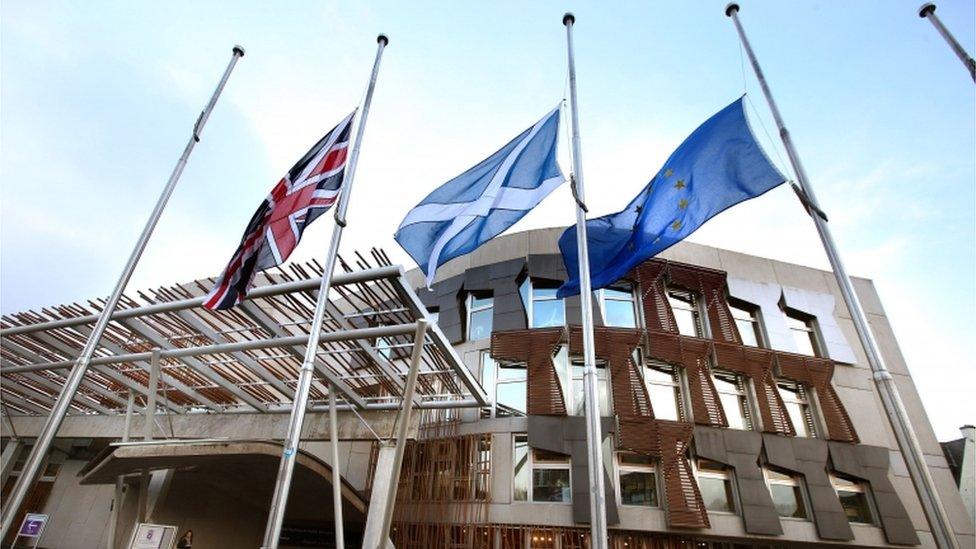
Arguments over Scotland's relationships with the UK and with the EU will form a big part of any new referendum campaign
The indyref2 campaign is already under way. Did it ever stop? Will it ever stop?
The arguments now are political and constitutional. But what about the economic part of the debate? It mattered a lot last time. It will matter a lot if there's to be a next time.
The sound of battle will be familiar, but significant parts of the weaponry have changed. If the combatants have any sense - by no means guaranteed - they'll have learned what worked in 2014, what risks being overworked, and what to avoid next time round.
As a consequence, my hunch is that economics will play a lower profile role. The pro-union side will surely want to stick with the familiar, but the battleground that the pro-indy side is more likely to choose is:
Democratic ("Scots wishes are being thwarted… bring back control'')
Identity ("do you feel Scottish or British, or Scottish and European?")
Values ("they want nukes and a royal yacht… we want to fight inequality")
Finance and economy, however, is what I cover. So mindful that it is only one of the debating battlegrounds in play, what has changed?

Trade
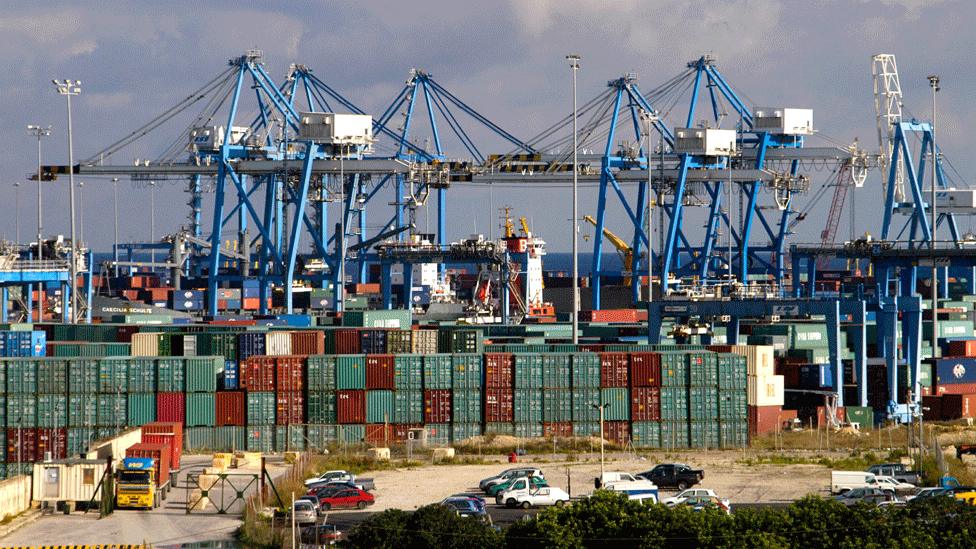
Way back in 2014, it was assumed an independent Scotland would wish to stay in the European Union. If it did, it would have access to the single market with the other 28 countries, including the rest of the UK.
There were disputes as to how easily an indy Scotland would secure EU membership. But apart from that, the proposition then seems relatively simple now.
The question now is how fast an independent Scotland would get back into the European Union, or if it would prefer to settle for Norway-style access to the single market without membership - for a price.
Supposing it did, then it could sell into that market of nearly 450 million Europeans, while making use of the EU's trading relationships around the world.
But it currently sells four times more to the rest of the UK than it sells to the rest of Europe. The access it would have to the market across the Cheviots would depend on the deal struck between Downing Street and the Berlaymont. The European Commission would revert to speaking for Scotland on trade.
So there could be a hard border between Scotland/Europe and England - not an impenetrable barrier, but an obstacle which brings hindrances, checks, paperwork, delays and perhaps tariffs.
That probably wouldn't be the choice of the government in Edinburgh, but would result from decisions made by political leaders in Brussels or London.
("Probably"? Yes, it's a risky word to use. We simply don't know what would happen. As in the past two referendums, the choice ahead is between different varieties of uncertain future.)

Currency
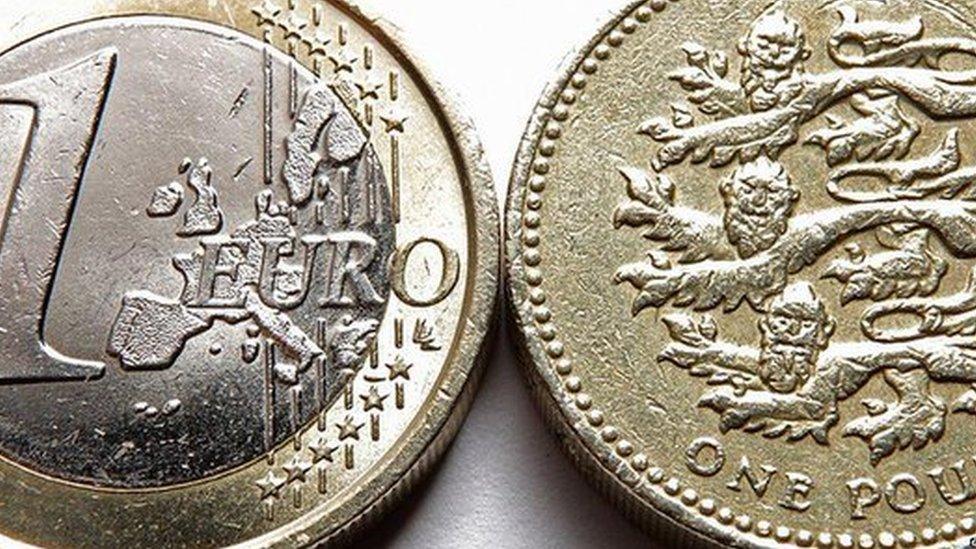
Would an independent Scotland end up using the pound or the Euro?
The question of Scotland's currency is going to sound familiar. Using the pound, the euro, or a new Scottish currency?
What seems to have gone quiet is talk of sharing control of sterling. That was the main target for pro-union attacks three years ago. Whoever was right, the focus on it didn't much help the pro-indy cause.
This time, I'm hearing more talk about shadowing sterling, or firmly pegging a Scottish currency to sterling through a so-called currency board.
It would keep transactions cheap and remove exchange rate uncertainty, but would leave Scotland's interest rates and the exchange value of its currency at the mercy of the Bank of England.
As such, what would the European Union members make of it? EU rules require new members to prepare for euro membership. That requires them to run their own currency for at least two years, and have all the institutions that go with it, including a central bank.
Could an independent Scotland simply ignore those rules, sign up without any intention of following through, or have its currency run from London, outside the European Union?
EU members' deficits, meanwhile - and even outside the euro - should be under 3% of national output. This month's budget shows the UK budget has reached that level, but only after seven years of austerity. Scotland's most recent deficit figure, for 2015-16, was 9.5% of total output.
Recent, very painful experience has made Europeans wary of those who flout such rules. If the euro project is to be sustained, the next phase will surely require firmer rules and tighter integration.

Oil
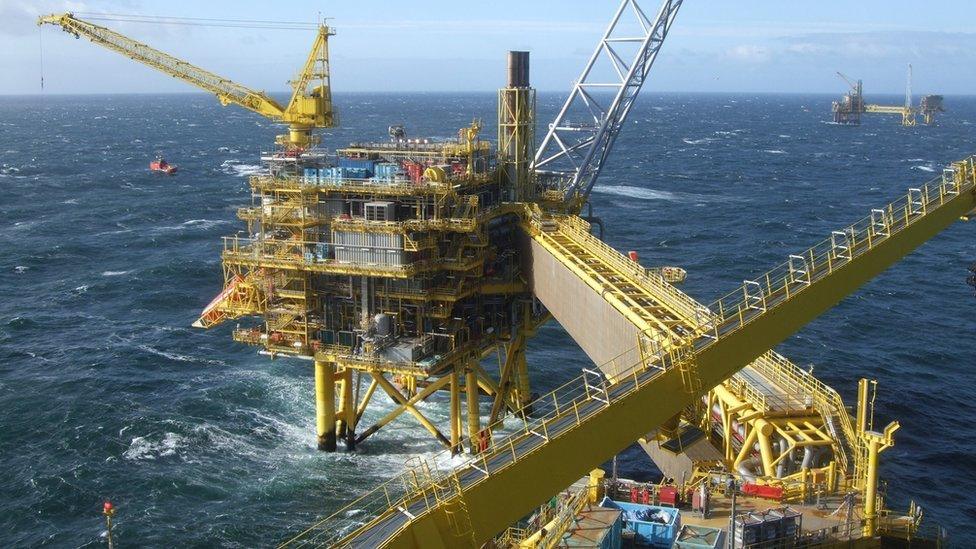
The UK's oil and gas industry has been struggling with a dramatic drop in oil prices over the past two years
So how about that deficit? The most recent Gers figures - government expenditure and revenue, estimated by the Scottish government - show that 9.5% 2015-16 deficit is a shortfall of £15 billion.
That may be affordable in the short run, if that money can be borrowed, possibly at a premium interest rate. But without superlative economic growth, it's not sustainable.
To be clear, that is a measure of how much spending is out of kilter with revenue. What it's not is a measure of Scotland's economic strength or weakness.
Much of it is a transfer, not from the Treasury, but from the bond markets, where the Treasury also depends on borrowing big. Or looked at another way, it's a transfer from future taxpayers.
Nor is it a position that would remain fixed in an independent Scotland. Having built the independence case on Gers figures in 2014, true believers now seek to undermine them.
They might be the starting point, it is conceded, but imagine what might follow. Indeed. Imagine. The deficit would force choices - of higher tax or lower spending, or whatever it would take to grow the economy a lot faster.
A lot of these numbers have to do with oil. Scotland's public finances have looked more sustainable when offshore tax from beneath its seabed has been factored in.
The 2014 prospectus for independence highlighted preceding years of bumper oil tax revenue, at more than £10 billion. The one-year snapshot for the an independent Scotland's first year, 2016-17, put offshore revenues at between £6.8bn and £7.9bn. The reality, with the oil price more than halved, is that tax revenues have gone slightly negative. Net, they're tax allowances.
This year, the oil price has firmed up. UK production is rising, following heavy investment. But it's not expected to be accompanied by much of an uplift in tax revenue - not with lower tax rates, more tax breaks, and more still being urged by the Scottish National Party. Annual take might reach £1bn in each of the next five years, says the Office for Budget Responsibility, but the days when oil was a gusher of tax revenue are in the past now.

Growth
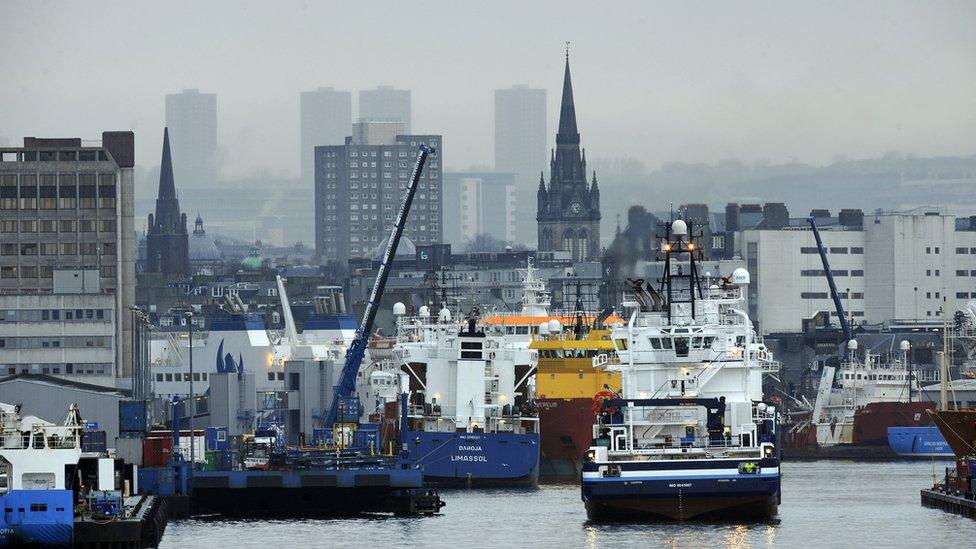
Nicola Sturgeon has tasked Andrew Wilson with working out how to boost growth in Scotland in the aftermath of the oil slump
So how will the pro-independence cause handle those fiscal gaps (apart from focussing instead on identity, values and democracy)?
Without tax increases or spending cuts which Labour describes as "turbo-charged austerity", the only alternative is growth.
It wasn't clearly spelled out in 2014 how growth would be boosted. If there is a transmission mechanism from "more powers" to making the right policy decisions, implementing them effectively and achieving a turbo-charged growth rate, then it wasn't revealed. It might be easier to achieve if there weren't competing priorities, such as increased public spending commitments or reducing inequality.
The growth commission set up by Nicola Sturgeon and led by former MSP and economist Andrew Wilson is trying to figure out a way through this.
It was Wilson who admitted recently that the "oil is a bonus" argument in 2014 was untrue. Those oil revenues were "baked in" to the Scottish government's figures, he said.
In that same interview, with my BBC colleague Sarah Smith, Andrew Wilson gave some other broad hints about his direction of travel.
It is towards honesty and candour about choices, and the difficulties an independent Scotland would face, at least initially.
If Nicola Sturgeon is to choose a referendum, he said, "she wants it to be on the basis of an exposition which is honest, transparent, full of content".
"We can be absolutely certain that when people come to choose, they'll have more certainty, more information, more of a sense of what the future might hold than probably in any other vote that they've had," says Wilson.
"What's also true is that the world is an uncertain place, so one of the great judgements we all have to make is in the face of such uncertainty, such tumult in the world at present, what do we do to look after ourselves and how do we protect our interests and secure ourselves? And that probably will be the core tone of any vote, should it come to it."

Campaign rhetoric
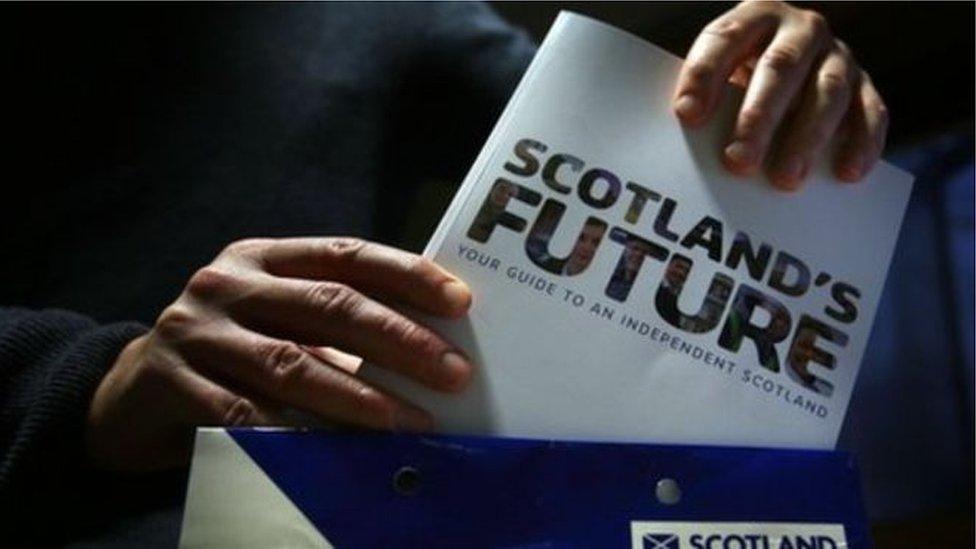
Will the pro-independence side set out as much detail in any coming campaign as they did in 2014?
His comments reflect one of the challenges now facing the pro-independence campaign in the wake of a Brexit and a Trump campaigns. In those, wild, unsubstantiated and deliberately misleading claims were made. For both Brexiteers and the new US president, reality is now biting.
Voters can see what happens when campaign rhetoric about getting easy results from future negotiations meets the harsh reality of well-prepared negotiating adversaries.
So "the Mexicans will pay for the wall", "Germans will do anything to ensure they can still sell Brits BMWs" and "Westminster will give Scotland whatever we ask" all meet scepticism.
Wilson reckons the Scottish electorate will now demand a higher quality prospectus. Yet there are plenty who think that a prospectus with far less detail than the 'Scotland's Future' white paper would serve the cause better. That's an interesting campaign dilemma.

Uncertainty
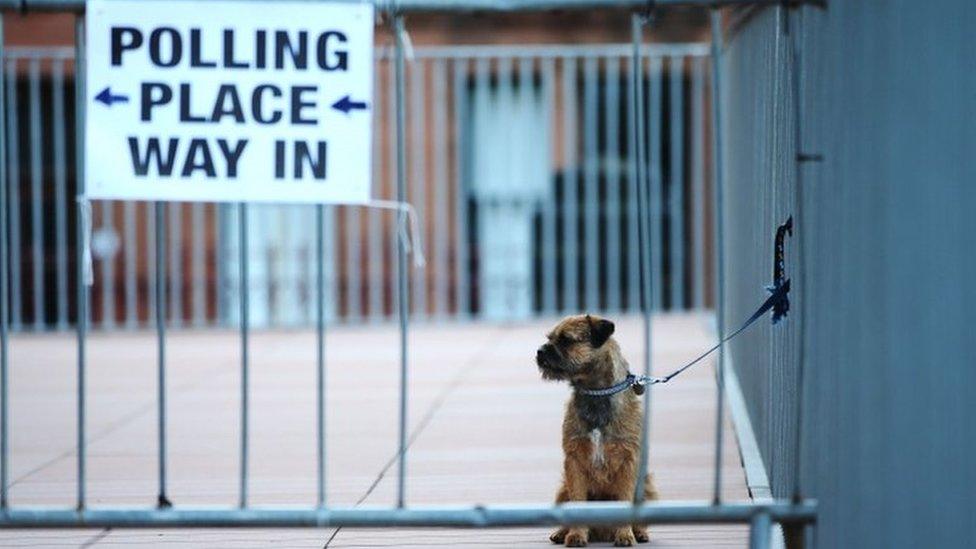
Voters in a second independence referendum could be facing a choice between two uncertain futures
All this is to suggest that the campaign will be defined by the pro-independence cause, and the question marks over its prospectus.
Of course, it won't. And what has changed most from 2014 is that the pro-union side is also offering an uncertain future, located somewhere in the political and economic unknown.
If there's to be a second independence referendum, it will not offer voters the choice of the status quo, but of Scotland either out of the EU, or out of the UK, or perhaps out of both.
Thus, when pro-union campaigners challenge nationalists on their future trading arrangements, the UK has even less clarity.
When they challenge on currency, that's after the Brexit vote pushed sterling over a cliff, fuelling import-driven inflation.
When they challenge on the fiscal black hole, that's with the UK government having repeatedly broken its own fiscal rules, and running up a debt now heading for £2 trillion.
And when the Prime Minister says the Scottish government has "tunnel vision", that it's treating politics like a game, that a referendum will be divisive and create uncertainty, and that Holyrood ministers should get back to improving public services… well, all the same criticisms could be levelled at the Westminster government and Brexit.
- Published14 March 2017
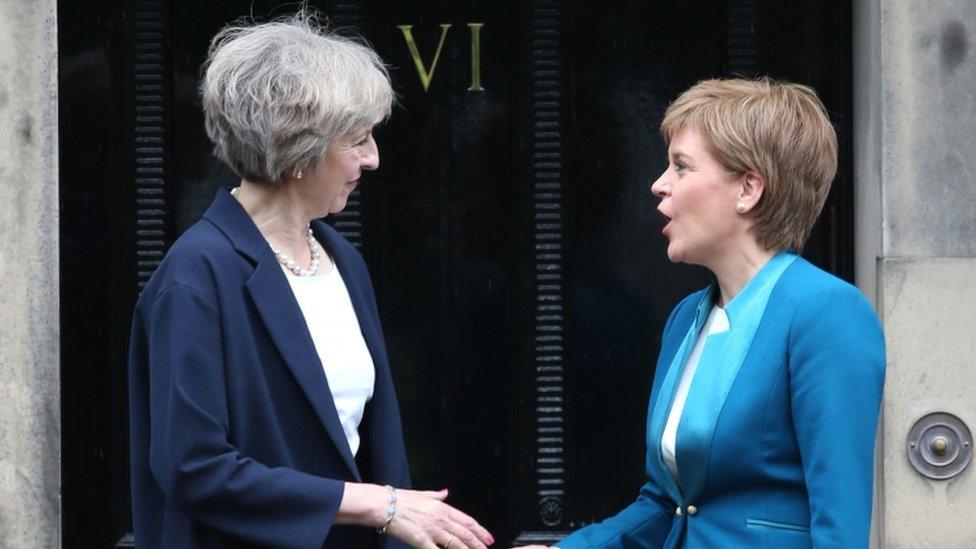
- Published10 April 2017
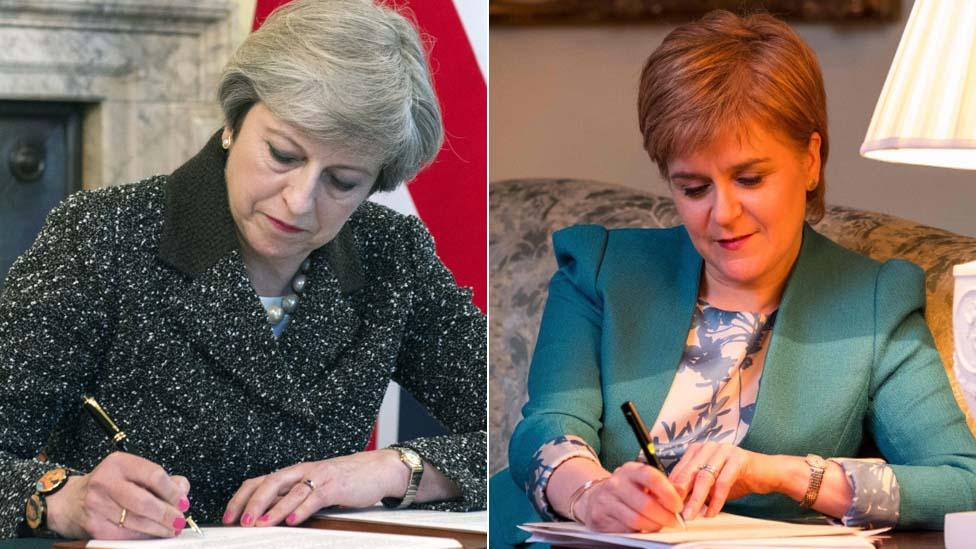
- Published6 March 2017
